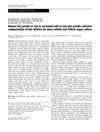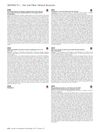18 citations,
October 1978 in “The journal of investigative dermatology/Journal of investigative dermatology” Excess vitamin A causes lasting gland changes in mouse hair follicles.
 39 citations,
April 1992 in “Development”
39 citations,
April 1992 in “Development” Both cell and non-cell parts are important for rat whisker follicle regrowth.
 10 citations,
January 2014 in “BioMed research international”
10 citations,
January 2014 in “BioMed research international” Rat whisker cells can help turn other cells into nerve cells and might be used to treat brain injuries or diseases.
 17 citations,
December 2001 in “Journal of Investigative Dermatology”
17 citations,
December 2001 in “Journal of Investigative Dermatology” The osteopontin gene is active in a specific part of rat hair follicles during a certain hair growth phase and might affect hair cycle and diseases.
 January 2025 in “Nature Communications”
January 2025 in “Nature Communications” Large-scale reconstructions enhance understanding of vibrissal sensory mapping in the brain.
 7 citations,
March 2022 in “Molecules”
7 citations,
March 2022 in “Molecules” 5-Bromo-3,4-dihydroxybenzaldehyde could potentially help hair growth by activating certain cell pathways and inhibiting others.
 27 citations,
May 2017 in “Marine Drugs”
27 citations,
May 2017 in “Marine Drugs” Undariopsis peterseniana extract helps hair grow by activating certain cell growth pathways and could be a new treatment for hair loss.
 9 citations,
March 2009 in “European Journal of Dermatology”
9 citations,
March 2009 in “European Journal of Dermatology” Schisandra nigra extract may help hair grow by stimulating cells and preventing hair follicle damage.
 46 citations,
January 1991 in “Journal of Investigative Dermatology”
46 citations,
January 1991 in “Journal of Investigative Dermatology” Minoxidil works in liver and outer hair root sheath for hair growth.
 208 citations,
December 2003 in “Journal of Investigative Dermatology”
208 citations,
December 2003 in “Journal of Investigative Dermatology” Certain cells from hair follicles can create new hair and contribute to hair growth when implanted in mice.
 January 2016 in “Korean Journal of Pharmacognosy”
January 2016 in “Korean Journal of Pharmacognosy” Grateloupia elliptica, a type of marine algae, may promote hair growth by activating a specific cell growth pathway.
 27 citations,
November 2005 in “Archives of Dermatological Research”
27 citations,
November 2005 in “Archives of Dermatological Research” Choosing hair follicles at the same growth stage leads to more consistent hair growth experiments.
 45 citations,
December 1991 in “Annals of the New York Academy of Sciences”
45 citations,
December 1991 in “Annals of the New York Academy of Sciences” ECM molecules are crucial for hair growth and development.
 166 citations,
November 1990 in “Journal of Investigative Dermatology”
166 citations,
November 1990 in “Journal of Investigative Dermatology” Minoxidil sulfate stimulates hair growth.
 14 citations,
January 2016 in “Biochemical and Biophysical Research Communications”
14 citations,
January 2016 in “Biochemical and Biophysical Research Communications” Ginsenoside Re from ginseng may help hair grow by blocking a specific growth-inhibiting pathway.

Grateloupia elliptica seaweed extract may promote hair growth by activating Wnt/β-catenin signaling and cell proliferation.
 13 citations,
March 2021 in “British Journal of Pharmacology”
13 citations,
March 2021 in “British Journal of Pharmacology” KY19382 helps regrow hair and create new hair follicles.
 66 citations,
August 2001 in “Experimental Dermatology”
66 citations,
August 2001 in “Experimental Dermatology” Human hair follicle cells can grow hair when put into mouse skin if they stay in contact with mouse cells.
56 citations,
February 2012 in “Developmental biology” Sostdc1 controls the size and number of hair and mammary gland structures.
 179 citations,
April 2012 in “Nature Communications”
179 citations,
April 2012 in “Nature Communications” Regenerated fully functional hair follicles using stem cells, with potential for hair regrowth therapy.
 11 citations,
October 2021 in “Stem Cell Research & Therapy”
11 citations,
October 2021 in “Stem Cell Research & Therapy” Hair follicle stem cells reduced hair loss and inflammation in mice with a condition similar to human alopecia.
 98 citations,
December 2003 in “The FASEB Journal”
98 citations,
December 2003 in “The FASEB Journal” Thymosin β4 promotes hair growth by activating stem cells in hair follicles.
 September 2017 in “Journal of Investigative Dermatology”
September 2017 in “Journal of Investigative Dermatology” The research concluded that hyaluronic acid affects the formation and growth of hair follicle-like structures in a lab setting.
 September 2017 in “Journal of Investigative Dermatology”
September 2017 in “Journal of Investigative Dermatology” BMPs are crucial for hair growth and their decrease by androgens leads to hair loss.
 September 2017 in “Journal of Investigative Dermatology”
September 2017 in “Journal of Investigative Dermatology” Blue light helps hair growth by affecting specific proteins in hair follicle cells.
64 citations,
March 2004 in “The journal of investigative dermatology/Journal of investigative dermatology” GPRC5D is linked to the formation of hair, nails, and certain tongue areas.
 11 citations,
January 2018 in “Acta dermato-venereologica”
11 citations,
January 2018 in “Acta dermato-venereologica” Researchers found specific genes in the part of hair follicles that could help treat hair disorders.
 August 2022 in “Research Square (Research Square)”
August 2022 in “Research Square (Research Square)” Implanted special stem cells from hair follicles helped heal wounds faster and with less scarring in mice.
 3 citations,
February 2009 in “Chinese Journal of Traumatology (english Edition)”
3 citations,
February 2009 in “Chinese Journal of Traumatology (english Edition)” Human hair cells can be used to grow new hair on rat ears, suggesting a possible treatment for hair loss.
231 citations,
December 1999 in “Journal of Investigative Dermatology” Hair follicle size is mainly influenced by the number of cells and extracellular matrix volume, with cell number having a larger impact.

























